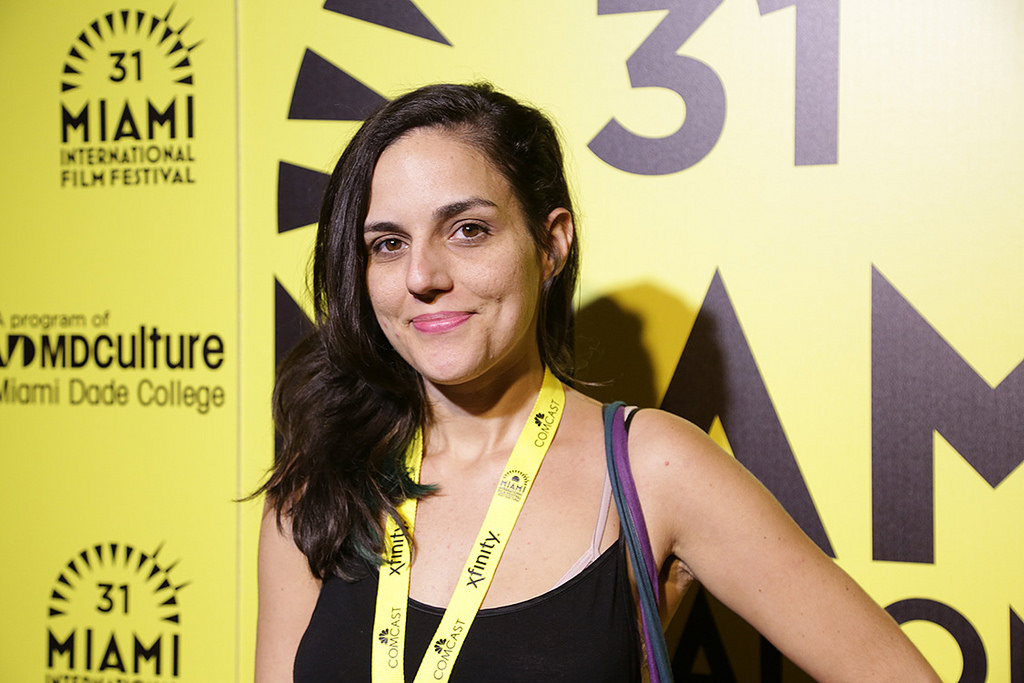
Making movies the Miami way
Above: Sundance Knight Fellow Monica Peña. Photo credit: Flickr user Miami Film Festival.
The work of up-and-coming Miami filmmaker Monica Peña is generating some serious heat.
And that’s due to her cinematic debut, “Ectotherms,” a 65-minute feature film that takes this scientific term, which refers to cold-blooded organisms dependent on outside sources for warmth, and gives it a Miami spin. The “ectotherms” in Peña’s movie are this city’s culturally cross-pollinated and disaffected youth.
Shot locally over just five days, with no budget, no script (other than the director’s conceptual guidelines) and with a cast of non-actors, “Ectotherms” had its world premiere at the recently held Miami International Film Festival. Then, Variety, one of the most respected entertainment industry media outlets, ran a glowing review of the movie.
That a seemingly noncommercial movie like this one can elicit such positive response is encouraging to South Florida’s independent film community—and reinforces the position that you don’t need to move to Hollywood to make interesting cinema.
“Knight Foundation grantee Lucas Leyva said something really smart a while ago,” remembers Dennis Scholl, Knight Foundation’s vice president for the arts. “He said, ‘You can go to L.A. and pull cables on somebody else’s film, or you can come to Miami and make your own film.’ That has resonated with a number of very interesting, young, dynamic, independent filmmakers, and Monica represents that. She’s chosen to come back here, try to find a way, make the film she wanted to make, and the results are astonishing.”
The 31-year-old Cuban-American director and writer was born and raised in Miami. She attended UCLA film school but never doubted that she needed to be in Miami to give life to her creative vision.
“Whether intentionally or not, what’s coming out in a lot of the works from here is sort of this intersection of cultural heritage,” Peña says, “where our connections to our families’ past and culture have been transplanted and transformed here. That intersects with this experience of … growing up in an urban environment and the hardships that can come with that. And then, that also intersects with this very particular landscape that is like no other landscape in the world.”
The landscape may radiate an eternally glowing party vibe, but in reality, Peña says, it “can actually be very oppressive, and very bleak and very grim.”
The story of the quartet of teenagers explored in “Ectotherms” encompasses universal themes, such as ennui and alienation, but it becomes unique in a South Florida setting that distinguishes it from works shot in other cities.
“I do think that there is an identifiable Miami wave or Miami school of work that maybe we’re too into it right now to really be able to talk about it critically, but given time, people are going to be able to see it and talk about it,” says Peña, who has worked in the movie industry since 2009 and is already in preproduction on her next film.
Peña also sees collaboration as a native part of South Florida filmmaking. Organizations such as Knight Foundation have cultivated that element.
“We believe that independent filmmaking is alive and well in our community,” says Scholl. “And Knight Foundation believes in helping artists tell those quintessential Miami stories.”
Knight has partnered with Sundance to hold a New Frontier Flash Lab, which focuses on the intersection of multiple disciplines, such as film, art, music and technology; and ShortsLab, which focuses on making short films. Earlier this year Peña attended the Sundance Film Festival as one of two Miami-based Knight Fellows.
Ilyse McKimmie, labs director of the Feature Film Program at Sundance Institute, says Peña “represents the kind of burgeoning talent we want to cultivate.”
“Monica brings a fresh, unexpected perspective to her work; in it we saw a truly independent voice and a willingness to challenge and experiment with the form,” she says.
The Miami International Film Festival also saw that talent, says Jaie Laplante, festival director.
Monica is “telling a narrative that uses film syntax and the language of cinema in a very experimental fashion [in] what I think is a free-form sort of way, although it is quite carefully planned, and that’s one of the blessings of the movie,” Laplante says.
“I’ve watched it multiple times, and I find it very rich and multilayered,” he says. “There’s a spirit to the work that goes beyond its form, which I also think had a lot of resonance for our audience at the Miami Film Festival.”
If Peña’s upcoming work continues down this path of critical success and manages to make it big, again with non-actors, an expanded concept rather than a traditional script, and limited funds, should the commercial movie studios be nervous about the future of filmmaking?
Peña laughs.
“I think that there are many, many different ways to make movies and to tell stories, and they are all valid. In some ways, I hope my work is original, but it’s also very friendly and inspired by the traditions of filmmaking.”
“Ectotherms” is available for download for a donation of $5 or more at www.ectothermsthefilm.com. Peña says the money raised will support her next film project.
Ectotherms – Trailer from Ectotherms on Vimeo.
Recent Content
-
Artsarticle ·
-
Artsarticle ·
-
Artsarticle ·

